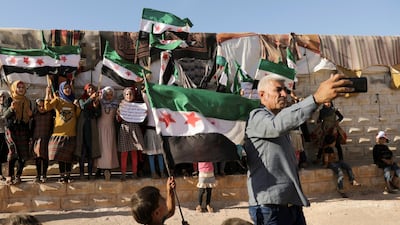Many things separate Idlib province from the rest of Syria. One of them is its ambulances, which are often painted the colour of mud or covered in camouflage netting to avoid attracting the attention of government jets trying to bomb them.
Idlib is the last rebel stronghold in the Syrian civil war. It is also the site of the last international humanitarian aid corridor into the country that isn’t connected to the government, in the town of Bab Al Hawa along the Turkish border.
The UN agreement that allows the corridor to operate, known as the Cross-Border Mechanism (CBM), originally included three others. But disagreements within the UN Security Council, which authorises the CBM, led to their closure.
Authorisation for the one at Bab Al Hawa is set to expire on July 10, and will not be renewed without positive votes from Russia and China, who appear unlikely to give them.
The Russian and Chinese position is rooted in geopolitics, but also the letter of the law. Generally speaking, the CBM is an illegal enterprise.
It was set up to allow UN aid to be channelled into areas of Syrian territory effectively outside the government’s control and without Damascus’s permission.
A 1991 UN General Assembly resolution prohibits the distribution of aid in this manner, in case humanitarian operations are used to undermine state sovereignty.
While Moscow and Beijing initially allowed the CBM to be created under the exceptional circumstances of the Syrian war’s early days, they now say it is time to return to international norms and send aid exclusively through Damascus.
But it was the Syrian regime’s breach of such norms, which include the right of civilians to receive humanitarian assistance unobstructed, that gave birth to the CBM in the first place, and Damascus has done nothing to inspire global confidence.
The regime continues to delay, refuse or obstruct much of whatever aid does pass through its fingertips.
Relief funds destined for the people of Idlib, who are portrayed by the regime as traitors, will not fare any better.

At the same time, Bab Al Hawa is no model of UN principles in action.
Its border post is overseen by a nominally civilian administration known to be controlled by Hayat Tahrir Al Sham, which is affiliated to Al Qaeda.
HTS frequently withholds UN aid as leverage over the local civilian population and operates a profitable smuggling business with the help of corrupt Turkish officials.
Its tyranny and the UN’s inability to ensure transparency lend weight to the Russian and Chinese argument, even if the proposed alternative is flawed.
A better solution would be to bring more order and transparency to the CBM until the broader situation in Syria is more stable.
Monitoring and verification systems that track aid from donor to recipient would be a start.
This would be easier if control over aid delivery were directly in the hands of the UN, which lacks a solid presence in Idlib, and the Red Cross, rather than local groups.
That would require the Turkish government, which exerts wide influence in Syria’s north-west, to lean on these groups.
At the same time, a joint monitoring mechanism that includes representatives from regional governments and world powers would instil confidence that the system works.
And if it did, such a system could be used to verify regime-controlled aid routes if and when UN assistance is eventually channelled entirely through Damascus.
Whatever transpires in the Security Council next month, Bab Al Hawa will not be the last border town of its kind.
The world will have no shortage of complex conflicts and situations that must be navigated on the ground to bring relief to suffering citizens.
A system to ensure that this is done effectively, and transparently, would help aid dollars to get where they need to go.


